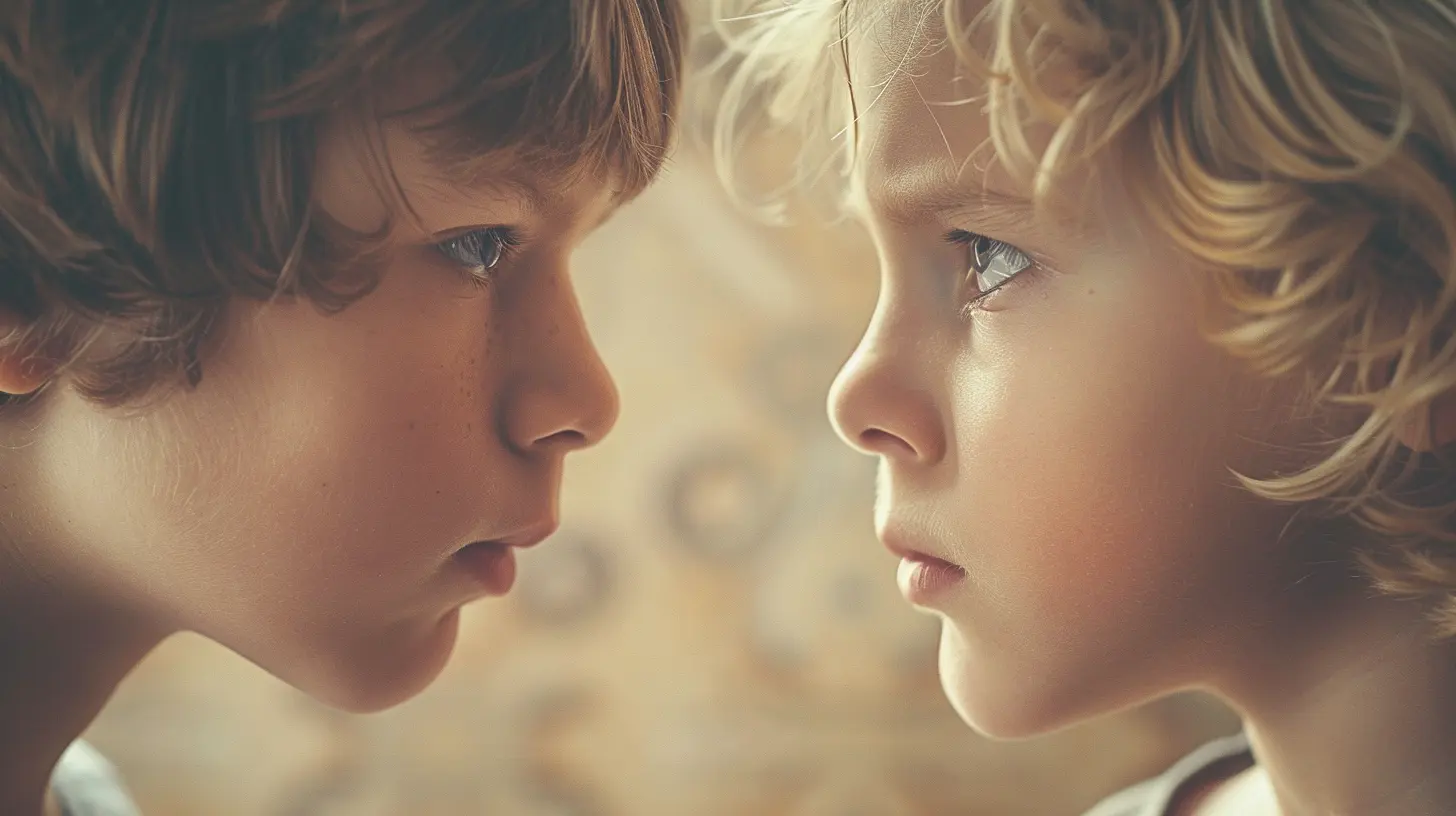The Power of Positive Reinforcement in Child Growth
23 May 2025
Parenting is a journey filled with countless decisions, and one of the most important is how you discipline and encourage your children. Have you ever noticed how kids respond better to praise rather than criticism? This is where positive reinforcement comes into play.
It’s not about spoiling kids with rewards but about shaping their behavior using encouragement and acknowledgment. So, how exactly does positive reinforcement impact child development? Let’s dive into it.
What is Positive Reinforcement?
Positive reinforcement is a psychological concept that encourages good behavior by rewarding or acknowledging it. Instead of focusing on what a child does wrong, it highlights what they do right.For example, if your child cleans up their toys, you might say, _"Wow! You did an amazing job cleaning your room! I’m so proud of you!"_ That simple acknowledgment boosts their self-esteem and makes them more likely to repeat the behavior.
It’s about reinforcing good habits rather than constantly pointing out bad ones.
The Science Behind Positive Reinforcement
Positive reinforcement is deeply rooted in psychology. B.F. Skinner, a well-known behavioral psychologist, introduced this concept through his work on operant conditioning. He proved that when behavior is rewarded, it's more likely to be repeated.Think about it. If someone compliments your work, doesn't it make you want to do even better? The same applies to children. When they feel appreciated, they strive to improve and continue their good behavior.
Types of Positive Reinforcement
There’s no one-size-fits-all approach to reinforcing positive behavior. Different children respond to different types of encouragement. Here are some effective methods:1. Verbal Praise
A simple “Good job!” or “I’m proud of you!” can work wonders. Kids crave validation, and hearing positive words from parents strengthens their confidence.2. Rewards and Incentives
This doesn’t mean spoiling your child with gifts. It can be as simple as extra playtime, a sticker on a reward chart, or choosing a bedtime story. These small gestures add up.3. Physical Affection
Hugs, high-fives, and pats on the back can make a big difference. A warm embrace after a child achieves something reinforces their sense of accomplishment.4. Quality Time
Spending time together as a way of rewarding good behavior is highly effective. Whether it’s a game night or a walk in the park, undivided attention strengthens the parent-child bond.5. Privileges and Responsibilities
Giving your child more autonomy as a reward teaches responsibility. For example, allowing them to pick a family movie after completing their homework on time makes them feel trusted.
Why Positive Reinforcement is Crucial for Child Growth
Now that we know how positive reinforcement works, let’s talk about why it’s important.1. Builds Self-Esteem
Children thrive on encouragement. When they feel valued, they become more confident in their abilities. This confidence carries into adulthood, shaping them into well-rounded individuals.2. Encourages Good Behavior Naturally
When children associate good behavior with positive experiences, they’re more likely to make the right choices on their own, without constant supervision.3. Strengthens Parent-Child Relationships
A home filled with encouragement fosters a strong emotional bond. Instead of fearing punishment, children feel safe voicing their thoughts, knowing they’ll receive guidance rather than harsh criticism.4. Reduces Negative Behavior
A child who feels recognized and supported is less likely to seek attention through misbehavior. They aren’t acting out for acknowledgment because they’re already getting it in a positive way.5. Develops a Growth Mindset
Children who experience consistent positive reinforcement learn that effort leads to success. They develop a mindset that embraces challenges instead of avoiding them.Common Mistakes Parents Make with Positive Reinforcement
Positive reinforcement is powerful, but only when used correctly. Here are some mistakes to avoid:1. Overdoing It
Praising a child for every tiny action can lead to an overinflated ego. The key is to recognize actual effort and achievements, not just routine tasks.2. Being Too Vague
Instead of saying, _“Good job!”_, try _“I loved how you shared your toys with your friend! That was very kind.”_ Being specific helps children understand exactly what behavior is being encouraged.3. Relying too Much on Material Rewards
Tangible rewards like toys or money should be used sparingly. If every good deed leads to a prize, children might only behave well for rewards rather than for personal growth.4. Inconsistent Reinforcement
If you praise your child one day and ignore their efforts the next, they may become confused. Consistency is key for positive reinforcement to be effective.5. Ignoring Effort
Sometimes, the result isn’t as important as the effort. If your child tries their best but falls short, they should still be recognized for their hard work.How to Implement Positive Reinforcement in Everyday Life
Now that you understand the concept, here’s how to incorporate it into your parenting routine:1. Set Clear Expectations
Children need guidelines. Let them know the behaviors you value so they understand what’s expected of them.2. Acknowledge Good Behavior Promptly
The sooner you reinforce good behavior, the better. If your child helps out, recognize it immediately to establish a strong connection between their action and your appreciation.3. Use a Reward System (But Keep it Simple)
A star chart or sticker system can be a fun way to track progress. Just make sure it remains fun and doesn’t turn into a pressure-filled competition.4. Be a Role Model
Children mimic adults. If they see you being kind, patient, and respectful, they’ll naturally adopt those behaviors.5. Balance Encouragement with Constructive Guidance
Positive reinforcement doesn’t mean ignoring mistakes. Instead of harsh punishment, guide them towards the right choices through constructive conversations.Final Thoughts
Positive reinforcement isn’t just a parenting technique—it’s a game changer. When used correctly, it shapes children into confident, happy, and responsible individuals.So, the next time your little one does something good, take a moment to recognize and appreciate their effort. You’ll be amazed at how a few kind words can make a world of difference.
Remember, raising a child is a long journey. A little encouragement along the way goes a long way in helping them grow into the best version of themselves.
all images in this post were generated using AI tools
Category:
Child DevelopmentAuthor:

Maya Underwood
Discussion
rate this article
3 comments
Rhea McKnight
Positive reinforcement: because bribing with cookies is a parenting strategy!
June 7, 2025 at 3:16 PM

Maya Underwood
Absolutely! Positive reinforcement, like rewarding with cookies, can effectively encourage desired behaviors in children while fostering a loving environment.
Zeke Whitley
Thank you for this beautiful reminder! Positive reinforcement truly transforms our parenting journey, fostering trust and confidence in our children. It’s amazing how a few encouraging words can inspire them to reach their full potential.
June 2, 2025 at 4:22 AM

Maya Underwood
Thank you for your insightful comment! I'm glad you found the article helpful—positive reinforcement truly makes a significant impact on our children's development.
Raelyn Dillon
Positive reinforcement plays a crucial role in child development. By acknowledging and rewarding good behavior, we not only boost our children's self-esteem but also encourage them to repeat those behaviors. This approach fosters a nurturing environment where children can thrive and build essential life skills. A powerful parenting tool!
May 26, 2025 at 3:25 PM

Maya Underwood
Thank you for your insightful comment! I completely agree that positive reinforcement is vital for nurturing self-esteem and encouraging desirable behaviors in children. It truly is a powerful parenting tool!



